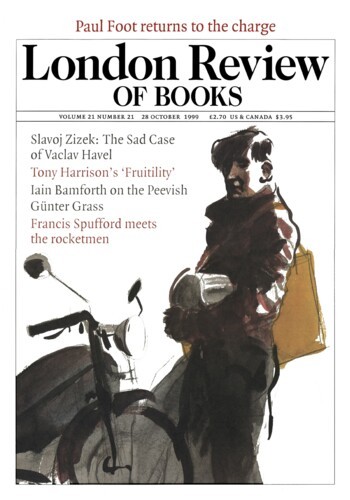Francis Spufford
Francis Spufford’s The Child that Books Built is out from Faber. He is working on a book about technology in Britain since the 1970s.
Love that Bird: supersonic
Francis Spufford, 6 June 2002
August 1974. Compared to the Cortinas and Maxis in the carpark, the prototype Concorde taxiing onto the runway at RAF Fairford looked astonishingly modern: but then, it always would. For the next quarter of a century, it would always be an object that stood out from its context, stylistically disconnected from the machines people build for more everyday tasks. Even now, when the carparks at...
Operation Backfire: Britain’s space programme
Francis Spufford, 28 October 1999
In November 1944 a group of men met in a London pub. In this fifth year of the war, the capital was dingy, dog-eared, clapped-out, frankly grimy. Though Britain had not shaken off its usual inefficiencies at mass production, it had converted its economy to the needs of the war more completely than any other combatant nation. For five years there had been no new prams, trams, lawnmowers,...
Revenge!
Francis Spufford, 4 July 1996
This book is presented as a pessimist’s primer, full of circumstantial evidence for the vanity of human wishes. It offers a portfolio of sharp blows to the back of the head, as good intentions boomerang. Dieting makes you fatter. Green washing-powder only replaces the algal blooms in the Adriatic Sea with mats of floating slime. But Edward Tenner’s book is dedicated, half-successfully, to subtler propositions about the contrariness of stuff. His argument, you could say, turns on the implicit difference between Sod’s Law (everything goes wrong) and Murphy’s Law (if something can go wrong, it will). While the first is vacuous – or a matter of the psychology which ensures we remember the times things go wrong and forget the times they don’t – the second is an engineer’s motto about the scope we allow to disaster. After a record-breaking run on a rocket sled at Edwards Air Force Base in the Forties, Captain Edward Murphy Jr discovered that all the recording instruments had been mounted backwards. The axiom he put in joke form had less to do with the human error involved than with the way the mechanical system had tolerated the error. The design of the gauges permitted them to be fitted wrong; the complexity of the system prevented the mistake from becoming apparent until results failed to appear. Why Things Bite Back, likewise, directs its attention towards the behaviour of systems, and our relationship with the particularly susceptible kind described as ‘tightly-coupled’, where the components act jostlingly on each other. It is about managing the unmanageable; it seeks intelligent responses to a world of malfunctioning cash dispensers.’
Read my toes
Francis Spufford, 5 August 1993
Seventeenth-century books of Arctic travels contained occasional reports of a kingdom in the far north of the Americas called Estoty: just out of reach over the icy horizon with its wealth, its monarch, its city of copper-roofed houses. Eventually the chimera-collecting eye of Vladimir Nabokov fell on Estoty. The horribly spry cast of Ada live in a Russo-American arcadia of the same name – a suitable metamorphosis of one kind of impossibility into another, perhaps. But the invention of Estoty also testifies to an aspect of European disappointment with the New World.
Pieces about Francis Spufford in the LRB
He blinks and night is day: ‘Light Perpetual’
Adam Mars-Jones, 17 June 2021
Readers of Francis Spufford’s Light Perpetual can get precise and unfussy answers to any number of questions. Who is responsible for Mike’s version of power dressing? Val, the friend of British nationalists,...
The HPtFtU: Francis Spufford
Christopher Tayler, 6 October 2016
Britain is good at producing historians, biographers, nature and travel writers and so on, but thanks, perhaps, to a not very extensive magazine infrastructure, powerful marketing departments...
Talking about what it feels like is as real as it gets: Whose Church?
Adam Phillips, 24 January 2013
No one can write about religion now without having in mind the new mockery that accompanies the new atheism. The new atheism’s ‘smug emissaries’ – as the blurb of Francis...
America comes to the USSR: The 1950s’ Soviet Dream
J. Hoberman, 6 January 2011
‘The Russians have everything in name, and nothing in reality,’ the Marquis de Custine observed in 1839, comparing the empire to a blank book with a magnificent table of contents....
Liquid Fiction: ‘The Child that Books Built’
Thomas Jones, 25 April 2002
In my nursery school nativity play, the Christmas before I turned five, I was cast as the narrator. My role involved sitting on a set of steps to one side of the stage in Silchester village hall,...
Cool It
Jenny Diski, 18 July 1996
Snow is cold. Some more information I am prepared to accept as plain fact: near 90° South if you take your gloves off for more than a few moments, your fingers die; at its edge, the 5.5...
Monsieur Mangetout
Walter Nash, 7 December 1989
The other Sunday, as I was taking my weekly televisual fix of gridiron football – not so much an athletic spectacle as an entrancing reconstruction of the wars of Pompey the Great – I...
Read anywhere with the London Review of Books app, available now from the App Store for Apple devices, Google Play for Android devices and Amazon for your Kindle Fire.
Sign up to our newsletter
For highlights from the latest issue, our archive and the blog, as well as news, events and exclusive promotions.





